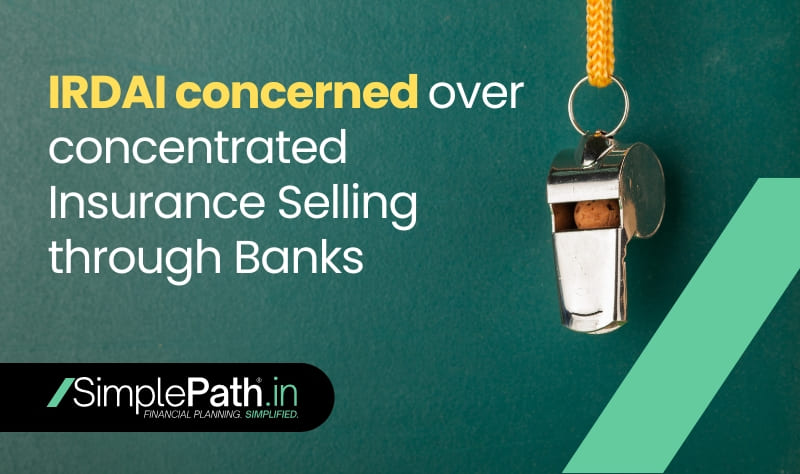As per reports, recently the IRDAI (Insurance Regulatory and Development Authority) has raised concerns over excessive concentration of business through Bancassurance, urging insurance companies to diversify distribution networks to mitigate risks.
Serious Concerns about Bancassurance
Insurance industry regulator IRDAI’s Chairman Debasis Panda urged bank to focus on their core job and not pedal insurance alone. Mr. Panda said that although the bancassurance channel is a very useful channel, of late a lot of ills have crept into the system, adding that there is “mis-selling” as well.
The statement came a day after Finance Minister Nirmala Sitharaman also made similar suggestions. On 18th November 2024, Finance Minister Nirmala Sitharaman had asked bankers to focus on their core jobs and avoid mis-selling of insurance policies, pointing that frequently, this also indirectly leads to increasing the cost of borrowing for a bank customer. Sitharaman has expressed concern over the rampant mis-selling of financial products, especially insurance, through banks, and highlighted its adverse impact on consumers. She said mis-selling not only leads to financial distress for individuals but also increases borrowing costs.
What is Bancassurance?
Bancassurance refers to a partnership between banks and insurance companies to sell insurance products through bank branches. This partnership with the insurance companies allows banks to leverage their extensive branch networks, customer databases, and relationships to market and distribute insurance policies. For insurance companies, it provides access to a large customer base without the need to establish a widespread physical presence or rely entirely on their insurance agents/advisor and brokers. The success of bancassurance depends on proper training of bank employees to promote the insurance products and ensuring compliance with regulations governing the financial and insurance sectors.
Ideally, with bancassurance, customers benefit from the convenience of accessing insurance products alongside their banking services, often with streamlined processes and cross-selling offers. Banks may sell life insurance, health insurance, general insurance, or other types of insurance, aligning the products with the financial needs of their clients.
Bancassurance is advantageous for banks as it generates additional revenue through commissions or profit-sharing agreements with the insurance companies. It is also an effective way for insurance companies to increase their market reach and brand visibility. Having said that, bancassurance has many advantages, it is not without its disadvantages and potential for wrongdoing.
Some key concerns about Bancassurance are:
- Mis-selling: Bank employees may not fully understand insurance products or could prioritise commission-driven sales, leading to customers being sold unsuitable or irrelevant policies, as well as providing incorrect information about the term of premium payment. For example, a customer may be sold a high-premium policy saying that it is a single payment policy and the customer later discovers that he/she has to pay the premium for 5 or 10 years.
- Conflict of Interest: Since banks earn commissions for selling insurance, there may be a tendency to push insurance products aggressively, even if they are not in the best interest of the customer.
- Lack of Expertise: Bank staff, often not trained as insurance experts, might fail to explain the terms, exclusions, and conditions of the insurance policy clearly, resulting in customer dissatisfaction later.
- High Pressure Sales: Some banks engage in coercive practices, such as making insurance purchases a condition for loan approval or linking them to other banking services, which is unethical and violates regulatory norms.
- Lack of After-Sales Service: Customers may struggle to get proper support for claims or policy renewals as bank staff often focus more on sales rather than post-sales service.
Possibility of limiting or capping of Bancassurance business
IRDAI has advised insurance companies to reduce the share of business sourced from banks to below 50% of their total individual annualised premium equivalent (APE). IRDAI has reportedly discussed this issue multiple times with the insurance industry over the past six months, stressing the need to diversify distribution channels and reduce risk.
If the insurance companies fail to make sufficient progress, IRDAI could introduce a system for gradually lowering the share of bank-driven sales.
According to the latest data, HDFC Life distributes 65 per cent of its insurance policies through banking channels, followed by SBI Life (60 per cent), Max Life (52 per cent), ICICI Prudential (29 per cent), and LIC (4 per cent).
Current Share of Bancassurance in Individual APE
| Company | Bancassurance Share in Individual APE |
|---|---|
| HDFC Life Insurance | 65% |
| SBI Life Insurance | 58% |
| Max Life Insurance | 52% |
| ICICI Prudential Life Insurance | 29% |
| LIC | 3% |
Additionally, IRDAI is monitoring the contribution of parent banks to bancassurance sales, with data showing significant dependence by certain insurance companies. Data from the first half of FY’25 underscores how dependent insurers are on their parent banks for insurance sales.
Bancassurance business – Share of parent bank
| Company | Parent Bank | Share of total bancassurance business |
|---|---|---|
| SBI Life Insurance | SBI | 95% |
| HDFC Life Insurance | HDFC Bank | 80-85% |
| Max Life Insurance | Axis Bank | 90% |
| ICICI Prudential Life Insurance | ICICI Bank | 50% |
How Bancassurance may lead to Mis-Selling?
Mis-selling occurs when financial products, such as insurance policies, mutual funds, or loans, are sold to customers without proper disclosure of terms or suitability. This could include:
- Selling products that do not align with a customer’s financial goals or risk appetite.
- Misrepresenting returns, benefits, or risks associated with the product.
- Pressuring customers into purchasing products they don’t need.
Such practices exploit the lack of financial literacy among customers and undermine trust in the financial system.
How insurance companies have responded
Insurance Companies have denied any formal directive from IRDAI. HDFC Life stated that regulatory changes of this scale are typically preceded by detailed consultations. SBI Life and Max Financial similarly clarified they are not aware of any specific regulatory communication on the issue.
This evolving situation is being closely watched by the industry and investors, given its potential to reshape the insurance distribution landscape. If implemented, the proposed measures could force insurers to diversify into alternative distribution channels such as digital platforms, agency networks, and direct sales.
As the insurance sector awaits clarity, the potential reforms underscore the regulator’s focus on balancing growth with long-term resilience and consumer protection.
References:
Business Standard: Bank-backed private life insurers’ scrips tumble on banca limit reports
Money Control: Bancassurance cap could pressure private life insurance players, say brokerages
The Economic Times: Irdai urges bankers to focus on core job, not sell insurance alone; avoid mis-selling





